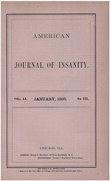Experience of a "slip" among alcoholics treated with naltrexone or placebo
Abstract
OBJECTIVE: This study tested the hypothesis that naltrexone reduces relapse rates among alcoholics by modifying the reinforcing effects of initial alcohol consumption and alcohol-induced craving. METHOD: Sixteen alcoholic patients treated with naltrexone and 27 treated with placebo who participated in a 12-week clinical trial reported retrospectively on their subjective responses to their first episode of a lapse into alcohol consumption and on their reasons for terminating the drinking episode. RESULTS: Compared to the subjects who received placebo, the subjects who received naltrexone reported lower levels of craving for alcohol and were more likely to give reasons for terminating drinking that were consistent with decreased incentive to drink. CONCLUSIONS: These findings support the hypothesis that a central effect of naltrexone is the modification of alcohol-induced craving.
Access content
To read the fulltext, please use one of the options below to sign in or purchase access.- Personal login
- Institutional Login
- Sign in via OpenAthens
- Register for access
-
Please login/register if you wish to pair your device and check access availability.
Not a subscriber?
PsychiatryOnline subscription options offer access to the DSM-5 library, books, journals, CME, and patient resources. This all-in-one virtual library provides psychiatrists and mental health professionals with key resources for diagnosis, treatment, research, and professional development.
Need more help? PsychiatryOnline Customer Service may be reached by emailing [email protected] or by calling 800-368-5777 (in the U.S.) or 703-907-7322 (outside the U.S.).



